|
ICEUR was founded by a Vienna-based group of concerned citizens from the academic, international and political communities,
who are aware of the stalemate in the EU-Russian relationship and pledge creative new approaches in research and policy consulting.
Following an interdisciplinary and multidimensional approach, the ICEUR explores the complex relations between the EU and Russia/NIS
in close cooperation with renowned Russian experts. Scope for improvement is identified and profound analyses are provided to relevant
experts and to the interested general public.
In June 2009, ICEUR presented the first Working Paper: “Background, Shaping Factors and Orientations of Russian Foreign Policy- Inside Views.” The Working
Papers are meant to provide a forum for experts from Europe, Russia and the Newly Independent States to comment on current topics.
The main part of the first Working Paper is an analysis of the Russian foreign policy, written by Andrey Ryabov, scholar-in-residence at the Carnegie
Endowment Center for International Peace in Moscow. Ryabov discusses the relationship between the domestic interests of the Russian elites and foreign
policy, a relationship that is arguably not always comprehensible for the West. Ryabov also touches upon the origins of today’s elites in Russia,
by exploring the situation in the nineties that brought about a complex amongst the elites of feeling offended and limited at the same time, and
a fixation on the status of the “lonely state” which walks along its own path. Ryabov argues that conflicts of interest amongst various Russian elite
groups make Euro-Russian relations ambiguous, oscillating between collision course and consensus-oriented approaches.
Shorter articles written by the members of the ICEUR team complement Ryabov’s analysis and discuss other aspects of the Russian foreign policy, such as
EU-Russia relations, NATO-Russia relations, implications of the war in Georgia and Russian policy on the Balkans. Two experts from Moldavia analyse the
role of Russia in the Transnistrian conflict. The foreword was provided by Johannes Hahn, the Austrian Federal Minister of Science and Research.
Mr. Hahn stresses the importance of international scientific cooperation, which is a field to which the ICEUR can make a substantial contribution.
|
|
 |
#2 - 2009
Critical Optimism: Russia and Europe cope with the Crisis
|
 |
|
In December 2009, ICEUR presented the second Working Paper: “Critical Optimism:
Russia and Europe Cope with the Crisis”. The Working Papers are meant to provide a forum for experts from
Europe, Russia and the Newly Independent States to comment on current topics.
The main part of the second Working Paper is an analysis of Russia’s coping with the global economic crisis,
written by Alexander Dynkin, Director of the Institute of World Economy and International Relations (IMEMO) in
Moscow and member of the Russian Academy of Sciences.
Dynkin discusses the impacts of the Crisis on Russia and describes the Russian policy’s reactions to the consequences
of the Crisis. This is the first crisis, which Russia experiences as a reformed national market economy and as a real
component of the global market economy.
Dynkin argues that recovery and further growth of the Russian economy is closely connected with the pickup of the global world economy,
especially of the economy of Russia’s main trade and investment partners (the EU, China, Republic of Korea).
Therefore Dynkin also touches the main trends and prospects concerning Russia’s relations with its economic partners.
Shorter articles written by experts as well as by the members of the ICEUR team complement Dynkin’s analysis and discuss other aspects of the global economic crisis.
Bernhard Felderer, Director of the Institute for Advanced Studies (IHS Vienna) and member of the ICEUR Scientific Advisory Council analyses the coherency
of financial market crisis and the real economy crisis.
Michael Löwy, Head of the Division of International Relations of the Federation of Austrian Industries (IV) describes the current economic developments in Austria as
well as in Middle and Eastern Europe. He underlines that Austria has to continue and even intensify its economic relations with Eastern Europe to guarantee growth and prosperity.
The foreword was provided by Reinhold Mitterlehner, the Austrian Federal Minister of Economy, Family and Youth. Mr. Mitterlehner stresses the importance of the commercial relationship
between Russia and Austria, to which consolidation ICEUR-Vienna is making a substantial contribution.
|
|
|
|
OTHER PUBLICATIONS
|
|

|
Heinrich, Hans-Georg / Lobova, Ludmilla (eds.)
Belarus: External Pressure, Internal Change
Frankfurt am Main, Berlin, Bern, Bruxelles, New York, Oxford, Wien, 2009.
394 pp, 1 fig., num tables, 1 graph
ISBN 978-3-631-59301-1 hardback €49,80*
|
|
This volume is a synopsis of various perspectives as well as a trans-boundary and
interdisciplinary analysis of the Belarusian model. It is the result of a dialogue among authors who, for various
reasons, take a supportive or critical approach towards the present regime. Their views are supplemented by
contributions written by authors from neighboring countries. The findings support the thesis that Belarusian
society, economy and the political system have begun to adapt to the new challenges the country faces. This
study marks an important step forward in the analysis of the intractable Belarusian model and helps to identify
its unique and ephemeral features.
Contents:
• Vladimir N. Shimov: Program-Target Approach to Transforming an Economy: Experience of Belarus (1991-2007).
• Leonid Zaiko: Belarus Today: Two Trajectories of One Country.
• Igor Katibmkov: Economic Reforms in Belarus.
• Yaroslav Romanchuk: The Belarusian Republic: Genesis, Results and Perspectives of the Neo-Planned Economy.
• Sergey Musienko: Belarus and Europe: Their Elites and Their View of Political Responsibility.
• Michail Marinic: The Economy of Belarus: From the Energy Crisis Towards Reforms and Cooperation With Europe.
• Svetlana Zavadskaia: Belarusian Mass Media. The Independence Period (1994-2007).
• Anna Zadora: The Belarusian Elite: Formation, Conduct and Developmental Dynamics. A Socio-Historical Perspective.
• Andrei Vardamatski: Freedom An Axiological Agent of Change in Belarus.
• Žygimantas Vaiciunas / Justinas Dementavicius: Scenarios of the Transformation of the Belarus Regime.
• Rafat Sadowski: Belarus Between the European Union and Russia: The Polish Perspective.
• Michael Delyagin: New Belarus for New Russia1 Past, Present, Future.
• Peter Havlik: Belarus Between Russia and the European Union: Some Reflections on the Belarusian 'Economic Miracle' and Future Prospects.
• Stephan Bansitz: The Belarusian Banking System.
• Martin Rossmann: Elections and Political Pluralism in Belarus.
• Yakov E. Kenigsberg: The Consequences of Chernobyl.
The Editors:
• Hans-Georg Heinrich is Professor emeritus at the Department of Political Science at the University of Vienna (Austria),
and Vice President of the International Center for Advanced and Comparative EU-Russia/NIS Research (ICEUR-Vienna).
He has authored and edited several books on post-Soviet politics and served in field presences of International organizations in various transition countries.
• Ludmilla Lobova is an ethnologist and political scientist with a track record in post-Soviet research. She is Scientific Director of ICEUR-Vienna.
|
|
|
|
|
* Unsere Preise verstehen sich zzgl. Versandspesen sowie inkl. Mehrwertsteuer. Preisänderungen bleiben vorbehalten.
Die Auslieferung erfolgt durch die Peter Lang AG, Bern/Schweiz
|
|
|

|
Kirill Tanaev / Hans-Georg Heinrich
with the assistance of ICEUR Team:
Katharina Beranek, Maria Dabic, Alexander Dubowy,
Florian Heindler, Markiyan Otava
FEP Team:
Elena Morenkova, Anna Veta, Tatiana Turubanova
Georgia & Russia:
Contradictory Media Coverage of the August War
|

|
|
|
As a first contribution to ICEUR’s
media work stream, a joint ICEUR-FEP (Foundation for Effective Politics, Moscow)
team has authored a research paper on “Contradictory Coverage of the August War”, a computer-assisted content analysis
of commentaries and reports about the Georgian-Russian War in August, 2008, in major Western Russian and Georgian print
media.
The publication can be retrieved online at http://www.cria-online.org (vol 3(3), Summer 2009).
CRIA (Caucasian Review of International Affairs) is a Germany-registered peer reviewed online quarterly academic journal.
|
|
|
|
|
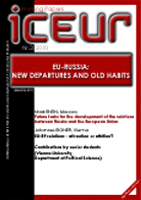
|
#3-2010 EU-Russia New Departures and old Habits
|
 |
|
|
Mark ENTIN, Moscow:
Future tasksfor the development of the relations between Russia and the European Union
Johannes EIGNER, Vienna:
EU-RF relations – attraction or attrition?
Contributions by senior students
(Vienna University, Department of Political Science)
|
|
|
|
|

|
Hans-Georg Heinrich, Ludmilla Lobova, Alexey Malashenko (eds.)
Will Russia Become a Muslim Society?
|
|
|
|
The somewhat provocative title of this volume relates to the lingering fears of Islamization which
are widespread also in Russia. Indeed, Islam has proved to be resilient and has become the main way
of life in Russia´s Islamic regions (the North Caucasus, Tatarstan and Bashkortostan). The contributions
to this volume were written by Russian researchers who are intimately familiar with Russia´s Islamic
communities, their history and the complex relationship between Islam and politics. The book highlights
the rich diversity of Russian Islam and explores the internal struggles and conflicts between radical
movements and conservative Muslim authorities. An empirical study among Chechen refugees in Austria
investigating the change of Islamic identities in a free society complements this insightful piece of
scholarly work which – unsurprisingly-arrives at the conclusion that Russia will not turn Islamic any time soon.
|
|
|
|
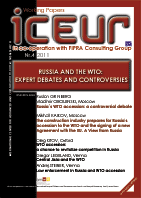
|
#4-2011 Russia and the WTO: Expert Debates and Controversies
|
 |
|
|
Ruslan GRINBERG | Vladimir OBOLENSKI, Moscow:
Russia´s WTO accession:
a controversial debate
Mikhail KAIKOV, Moscow:
The construction industry prepares for Russia's accession to the WTO and the signing of a new Agreement with the EU.
A View from Russia
|
|
|
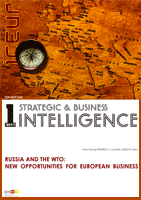
|
ICEUR Studien #1-2011 RUSSIA & THE WTO:
NEW OPPORTUNITIES FOR EUROPEAN BUSINESS
|
 |
|
|
Russia’s accession to the WTO that has been under discussion since 1993 should not be misinterpreted
as a universal remedy for all shortcomings and challenges in the relations between industrialized countries
and Russia. As a matter of fact, only time will display the actual effects and consequences of Russia’s entry
to the WTO.
Vladislav Zagashvili resumes the discussion on the desirability of Russia’s WTO accession from the viewpoint of different stakeholders
like consumers and manufactures, major corporations and small-scale businesses. As a result he expects growth impulses but at the same
time efforts of some branches to remain in the protected zones as long as possible.
Anna Bessanova looks into what factors amongst the WTO accession will exert influence on the Russian economic development. She states that
it is not so much the entry to the WTO as the interests of Russian elites that are relevant to the economic trajectory of the country as
well as the interest in restructuring of the governmental institutions.
From Ruslan Grinberg’s and Vladimir Obolenksi‘s point of view, on the contrary, the accession marks the breakthrough in Russia’s effort to structural
changes in the economic system. As a consequence it will further the creation of a competitive environment and of a legal framework conforming to
world standards.
Michail Kaykov emphasizes the importance and inevitability of Russia’s WTO accession and the conclusion of a new Partnership Agreement with the EU.
In his article he points at systemic deficiencies in need of correction that can cause trouble in cooperation. Furthermore he demands common conferences
and a higher degree of direct business participation.
Finally Vasily Astrov evaluates the possible impacts of Russia’s WTO accession on Austria. On basis of data giving an overview of trade relations between
Russia and Austria he concludes that Russia’s entry implies further trade expansion due to coming reductions of import tariffs.
|
|
|
|
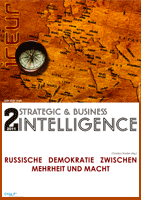
|
ICEUR Studien #2-2011 RUSSISCHE DEMOKRATIE ZWISCHEN MEHRHEIT UND MACHT
|
 |
|
|
As many Russian thinkers of the 20th century wrote, until the end of the 18th century Russia was not a
society but a state. Even today the state fulfils the tasks society is meant to perform. The second edition of ICEUR’s
analyses, which was presented at the Round Table on October 17th 2011, presents various viewpoints on Russia and the
topic of democracy.
In his article Christian Stadler states that the formation and cultivation of democracy is not so much a problem of historical change
than an ethical matter of how a given democracy shapes itself and how power is exercised. In Stadler’s opinion, the traditional “Russian majority”
is now faced with the challenge of legitimizing dominance. In this context, he recognizes a potential regarding a political change in the elections of 2012.
In Vladimir Kantor’s point of view the reason why the state performs the peoples tasks lies in the shortcomings of Russian democratic
traditions. In his article he traces the possible causes for democracy’s defeat in Russia throughout the history and tries to find an answer to
the questions, why it seems impossible to establish a European-American type of democracy in Russia and if today there are possibilities to so at all.
Boris Kagarlickij analyses the Soviet political heritage and its implications for democracy in Russia and argues in what regards today’s Russia should
and could benefit from and transform the Soviet tradition.
Similarly, Alexander Logunov takes a closer look at the Russia's very own democracy at times of the Soviet Union to gain deeper understanding
for democracy's condition in Russia and the possibilities to establish democratic values.
Gleb Pavlovskij discusses how relevant a “stable majority” is for the system in Russia. Comprehension of the way how to utilize
the “majority” in Russia has become the key factor in establishing an understanding for the future of the system and potential alternatives. Without doubt,
the Russian governance is dependent on its own “majority” but in what kind of relation they find themselves intertwined with each other is another relevant
matter that has not been given the necessary attention.
|
|
|
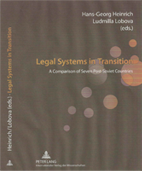
|
H.-G. HEINRICH, L. LOBOVA (eds.) LEGAL SYSTEMS IN TRANSITION
|
|
|
|
The modernization of the legal systems in the post Soviet states is a
paramount objective of the EU. The transfer and the integration of the
norms of the acquis communautaire into the domestic legal systems have
progressed at a different pace and within different scopes.
This volume
compares the legal systems of Russia and the 6 countries participating in
the Eastern Partnership Program. The country studies highlighting
achievements and shortcomings of the process of legal transformation are
written by eminent practitioners and legal scholars and focus on business
law. The volume represents a pioneering effort supported by the Austrian
Ministry of Economy, Family and Youth.
|

